The King Holiday
In honor of Dr. Martin Luther King, Jr., we will not publish on Monday. We'll see you all again on Tuesday morning, January 21. (And we hope to see many of you in person next week during the Winter Institute in Baltimore, Md.)
In honor of Dr. Martin Luther King, Jr., we will not publish on Monday. We'll see you all again on Tuesday morning, January 21. (And we hope to see many of you in person next week during the Winter Institute in Baltimore, Md.)
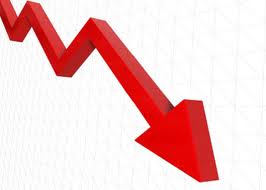 |
|
In November, bookstore sales fell 7.3%, to $697 million, according to preliminary estimates from the Census Bureau. For the first 11 months of the year, bookstore sales have fallen 5.5%, to $8.8 billion.
By comparison, independent bookstores have done better than the Census Bureau average, which includes a range of retailers that sell books. Through November 13, slightly less than the 11-month period measured by the Census Bureau, sales at ABA member stores, as reported to the weekly bestseller lists, are up 0.1% compared to the same period in 2018. Compound annual growth among ABA member stores is 7.5% during the past five years.
Total retail sales in November rose 2.8%, to $537.6 billion. In the first nine months of the year, total retail sales rose 3.3%, to $5.6 trillion.
Note: under Census Bureau definitions, the bookstore category consists of "establishments primarily engaged in retailing new books."

Initially launched in 2018 with a testing phase in partnership with a handful of regional bookstores, ReadTribe's site is now ready for more indie bookshops across the country to sign on and begin serving their customers.
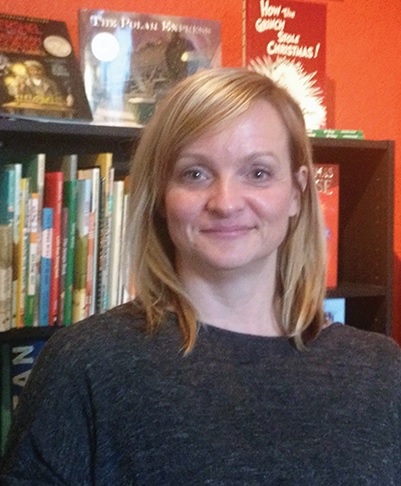 |
|
| Nicole Sullivan | |
"The concept is simple even though the roll-out has been complex," she said. "There is a chicken and egg situation at work where we want as many users as possible but we want those users to be connected with their local, indie bookstore. So the first step is to get my bookstore colleagues on board."
The website invites readers to sign in as individual users; they can browse through lists of book clubs, narrowing by ZIP code, reading styles, book club reading goals, genre focus or the bookstores to which they are linked. Users who already have book clubs and are seeking new members, or just looking for a way to organize their groups better, can create a book club profile, and set it to public or private, accepting or closed to new members (toggling back and forth as needed), with features such as member polling, forum, calendar, book club news, bookstore news and book recommendations.
According to ReadTribe, bookstores can enjoy the benefits of a free service that allows them to manage book clubs better that meet and/or shop in their stores. Admins of the bookstore's profile can update their events and book recommendations, which appear on the sidebar of each affiliated book club's page. Any book club recommendations will link to the store's IndieCommerce page for easy and direct purchase. Bookstores can highlight amenities they offer to their book club affiliates, such as meeting space or discounts on book club orders. ReadTribe provides marketing materials to each bookstore that signs on so they can easily get their customers on board.
"This will be a way for all of us booksellers to be able to directly market and sell to all of those book club customers that we know we have but haven't had a great way to reach directly," Sullivan said. "I wanted a solution for this and I wanted to be able to share this solution with all of my bookseller friends so we can all sell more books."
The service is free to users and booksellers, with ad opportunities for publishers and authors. For more information, contact Anne DeLong at anne@readtribe.com.
Last week's announcement by libro.fm of the creation of Bookstore Link just a few weeks before the launch of Bookshop has caused some confusion in the book world, since the programs overlap in some ways but have significant differences in others--and similarities in some ways with IndieBound.org. Here Shelf Awareness aims to try to clarify matters.
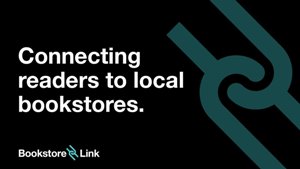 Bookstore Link was created by Libro.fm, the private company that specializes in selling downloadable audiobooks through more than 900 independent bookstores. Bookstore Link is a simple tool that can be used by authors, media and people on social media to find a bookstore to purchase the print or audio version of a book. The links go to Libro.fm partner stores and are integrated with the ABA's IndieCommerce and IndieLite sites, as well as Bookmanager, so that consumers clicking on a title will be taken directly to a store's page for that book. Stores that don't partner with Libro.fm can sign up for free and be included in the Bookstore Link store listings. The bookstore keeps all the proceeds from the print book sale; the bookstore and Libro.fm share the proceeds of the audiobook sale under their normal agreement.
Bookstore Link was created by Libro.fm, the private company that specializes in selling downloadable audiobooks through more than 900 independent bookstores. Bookstore Link is a simple tool that can be used by authors, media and people on social media to find a bookstore to purchase the print or audio version of a book. The links go to Libro.fm partner stores and are integrated with the ABA's IndieCommerce and IndieLite sites, as well as Bookmanager, so that consumers clicking on a title will be taken directly to a store's page for that book. Stores that don't partner with Libro.fm can sign up for free and be included in the Bookstore Link store listings. The bookstore keeps all the proceeds from the print book sale; the bookstore and Libro.fm share the proceeds of the audiobook sale under their normal agreement.
Libro.fm has had a marketing agreement with the ABA for libro.fm but not for Bookstore Link. Founder and CEO Mark Pearson says that the company has found that many Libro.fm users are listening to audiobooks and reading more print books, and Bookstore Link makes it easy for them to do so from their local bookstore. "Our goal is to drive traffic to stores' websites instead of Amazon," he says.
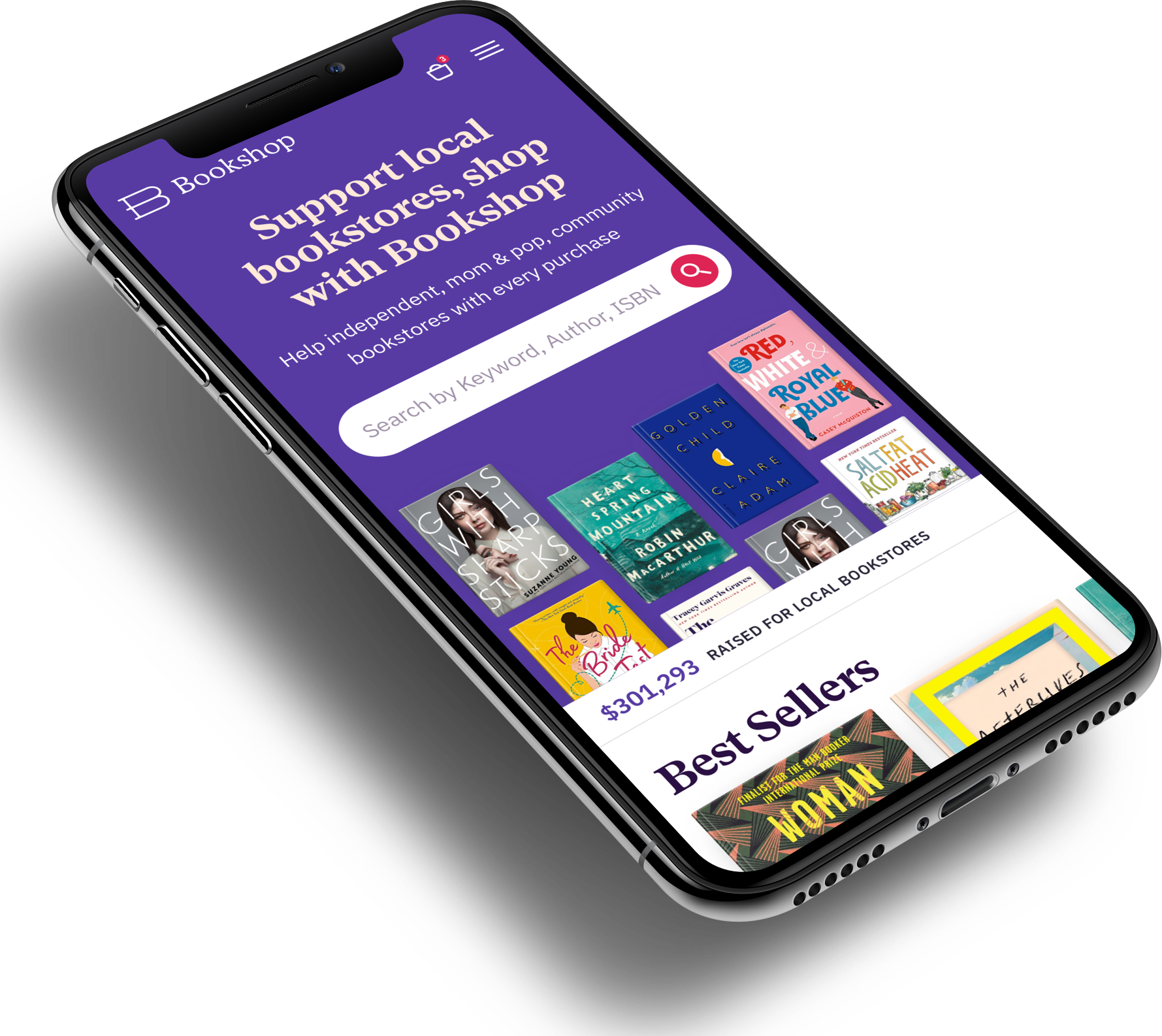 Bookshop is a B-Corp. (a for-profit entity that aims to be socially beneficial) created by Andy Hunter, a co-founder of Electric Literature, LitHub and Catapult, that intends to build "a network of publishers, authors, bookstagrammers, celebrity book clubs, and other media sites to target socially-conscious online consumers who are not yet buying their books online through an independent bookstore"--and keep their sales from going to Amazon. Hunter notes that Bookshop is ideal for publishers and other organizations that want to link somewhere that supports indies but don't want to limit it to a single store.
Bookshop is a B-Corp. (a for-profit entity that aims to be socially beneficial) created by Andy Hunter, a co-founder of Electric Literature, LitHub and Catapult, that intends to build "a network of publishers, authors, bookstagrammers, celebrity book clubs, and other media sites to target socially-conscious online consumers who are not yet buying their books online through an independent bookstore"--and keep their sales from going to Amazon. Hunter notes that Bookshop is ideal for publishers and other organizations that want to link somewhere that supports indies but don't want to limit it to a single store.
An affiliate of the ABA, Bookshop is designed to benefit independent bookstores in a variety of ways. Bookstores can participate by signing up as a partner and share in a pool of money created by Bookshop, representing 10% of Bookshop's gross sales. Bookstores that become affiliates (and can then work with Bookshop to create a website, links and content specific to the store, and sell through Bookshop) receive 25% of the gross sales they generate. Bookshop has three independent booksellers on its board. Hummingbird Digital Media will provide e-book sales on Bookshop. For now, there is no designated downloadable audio partner on Bookshop, although Libro.fm would be a logical choice; Hummingbird could also provide that service. Bookshop will launch later this month; it will be highlighted at Winter Institute next week.
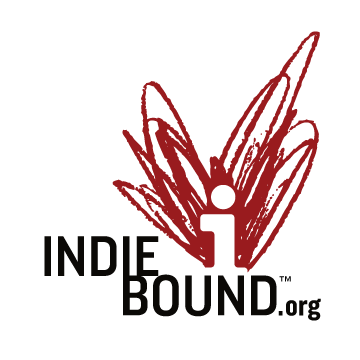 Launched in 2008, the ABA's IndieBound.org site has offered consumers two ways to buy books, either directly through an IndieBound.org buy button or through an independent bookstore with IndieCommerce, IndieLite or another e-commerce solution. With the launch of Bookshop, which the ABA has been working with, IndieBound.org's buy buttons will go to Bookshop. In another major change, IndieBound.org will expand the roster of bookstores it refers customers to so that all ABA member stores, whether or not they have e-commerce websites, will be listed. (It had limited the roster to the approximately 500 members with IndieCommerce or IndieLite e-commerce sites as well as members with other e-commerce sites, so as not to frustrate consumers who wanted to buy books online as quickly as possible.)
Launched in 2008, the ABA's IndieBound.org site has offered consumers two ways to buy books, either directly through an IndieBound.org buy button or through an independent bookstore with IndieCommerce, IndieLite or another e-commerce solution. With the launch of Bookshop, which the ABA has been working with, IndieBound.org's buy buttons will go to Bookshop. In another major change, IndieBound.org will expand the roster of bookstores it refers customers to so that all ABA member stores, whether or not they have e-commerce websites, will be listed. (It had limited the roster to the approximately 500 members with IndieCommerce or IndieLite e-commerce sites as well as members with other e-commerce sites, so as not to frustrate consumers who wanted to buy books online as quickly as possible.)
While it's unlikely that indie booksellers can use all these online sales options together, they do overlap and have somewhat different focuses, offering indies a range of choice. As a result, ABA president Jamie Fiocco, owner of Flyleaf Books, Chapel Hill, N.C., says, "It will require more homework to be done by members to figure out what solution works best for them." She adds the ABA is always looking to "identify tools that will make us more viable." The association has been working with Bookshop for "a year now and we're excited about its release." Calling Libro.fm "a great partner," she says, "We look forward to working with them, too."
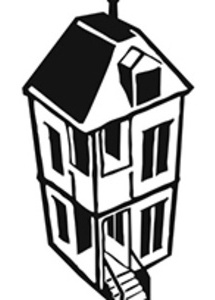 Tin House Books has launched a scholarship program to bring an independent bookseller to its annual Tin House Summer Workshop.
Tin House Books has launched a scholarship program to bring an independent bookseller to its annual Tin House Summer Workshop.
The selected bookseller will attend as a Tin House Scholar and receive full tuition, room and board for the workshop, which is scheduled to take place July 11-19 at Reed College in Portland, Ore. The workshop faculty for this year includes Kristen Arnett, Hanif Abdurraqib, Nicole Dennis-Benn, Tommy Orange and more.
Booksellers have until March 11 to apply.
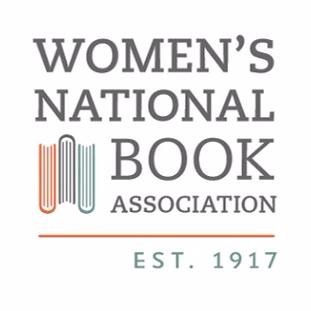 Nominations are now open for the WNBA Pannell Award, which is co-sponsored by the Women's National Book Association and Penguin Young Readers Group. The award "recognizes bookstores that enhance their communities by bringing exceptional creativity to foster a love of reading and books in children and young adults." One Pannell Award is given to a general bookstore and one to a children's specialty bookstore.
Nominations are now open for the WNBA Pannell Award, which is co-sponsored by the Women's National Book Association and Penguin Young Readers Group. The award "recognizes bookstores that enhance their communities by bringing exceptional creativity to foster a love of reading and books in children and young adults." One Pannell Award is given to a general bookstore and one to a children's specialty bookstore.
Nominations can be made by customers, sales reps, bookstore personnel or anyone else either by completing the online nomination form or by sending an e-mail to WNBAPannell@gmail.com. Nominations need to include the name, e-mail address and phone number of the person making the nomination; that person's connection to the nominated store (such as customer, owner, employee, publisher); bookstore name, address and contact information for the bookstore owner/manager; and a brief statement outlining the reasons for nominating the store.
Nominations must be made by February 3, after which the WNBA Pannell Award chair will reach out to all nominated bookstores to request a formal electronic submission. Once the jurors have reviewed all submissions, the winning bookstores will be notified by phone; all submitting bookstores will also receive a call.
Each of the two winners receives a $1,000 check and a framed, signed original piece of art by a children's book illustrator during a presentation at BookExpo's Children's Book and Author Breakfast this May in New York City.
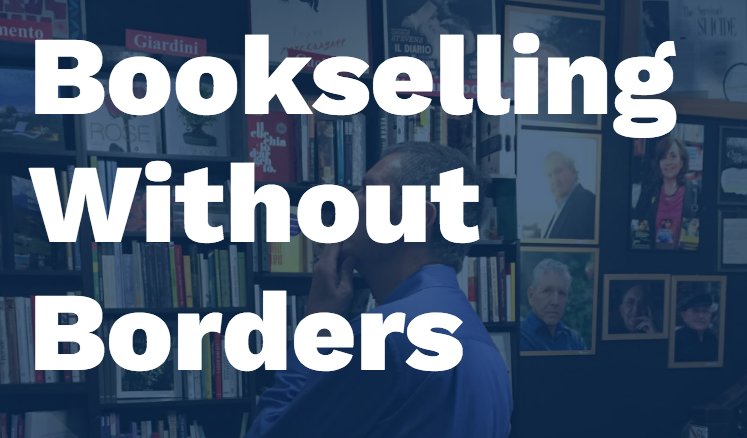 |
|
The application period for the 2020 Bookselling Without Borders fellowships is now open. Interested booksellers can apply online until February 16.
The BWB program is expanding this year to include the Shanghai International Children's Book Festival and the Bogotá Book Fair, along with the Bologna Children's Book Fair, the Turin Book Fair and the Frankfurt Book Fair. The program is looking for booksellers interested "in diverse and international literature and in fostering relationships with the international literary community."
For more information, interested booksellers can reach out to BWB program coordinator Anna Thorn at booksellingwithoutborders@gmail.com.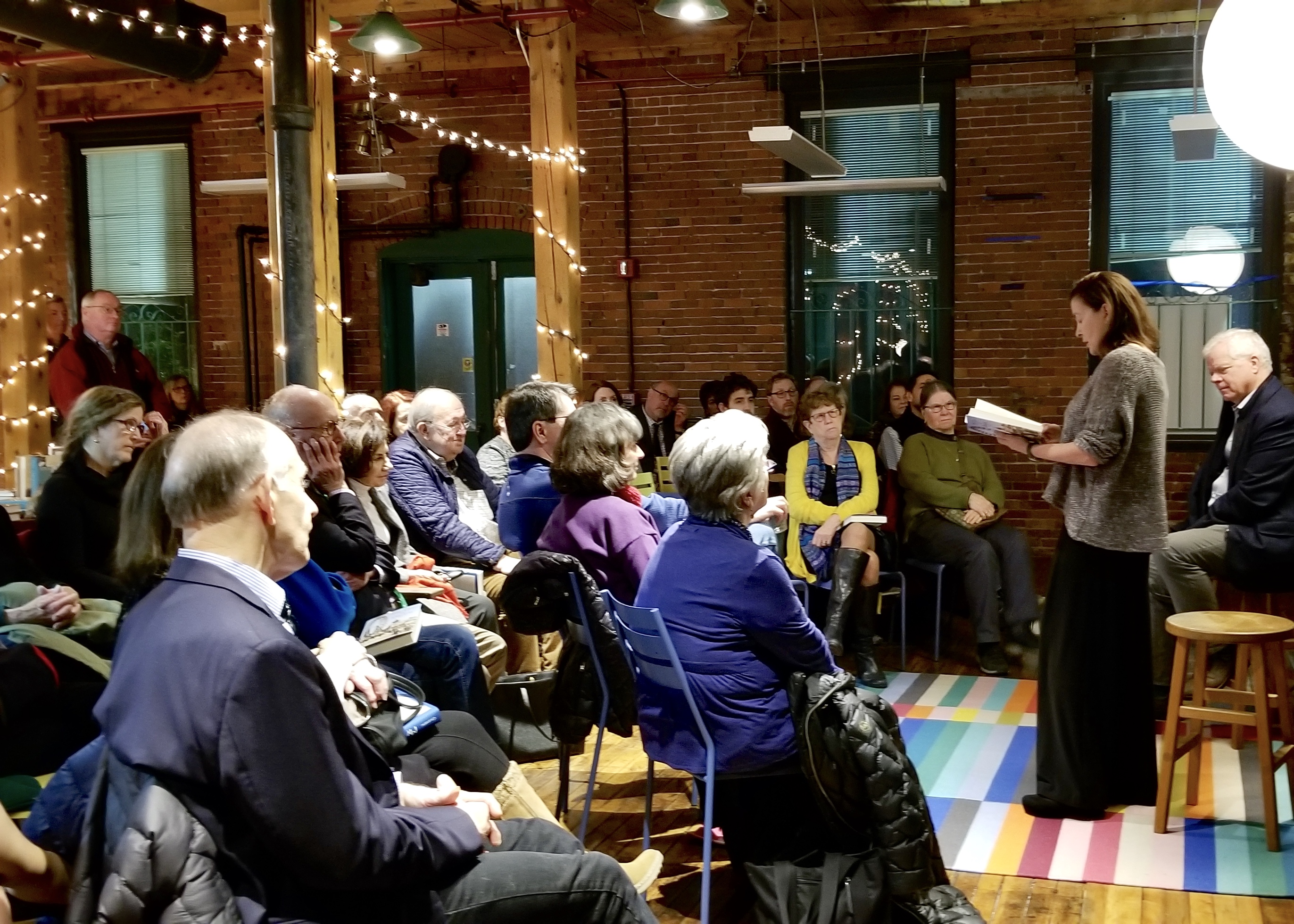 Lisa Gruenberg read from her memoir My City of Dreams (TidePool Press) to about 60 people at a popup at the soon-to-be-open TidePool Bookshop in Worcester, Mass. In the carefully researched book, in dreamlike sequences, Gruenberg conveys the lives of relatives in Austria lost in the Holocaust, weaving facts of their lives into tableaus of imagined family dinners, conversations, and leisure activities in Vienna. She also relates the story of her own life, her husband and daughters--and her father who escaped from Vienna in 1939 and shared only a few memories of that time with her, and then only late in life. The memoir explores trauma and survivors' feelings of guilt, but also is a tale of lightness and finding balance.
Lisa Gruenberg read from her memoir My City of Dreams (TidePool Press) to about 60 people at a popup at the soon-to-be-open TidePool Bookshop in Worcester, Mass. In the carefully researched book, in dreamlike sequences, Gruenberg conveys the lives of relatives in Austria lost in the Holocaust, weaving facts of their lives into tableaus of imagined family dinners, conversations, and leisure activities in Vienna. She also relates the story of her own life, her husband and daughters--and her father who escaped from Vienna in 1939 and shared only a few memories of that time with her, and then only late in life. The memoir explores trauma and survivors' feelings of guilt, but also is a tale of lightness and finding balance.
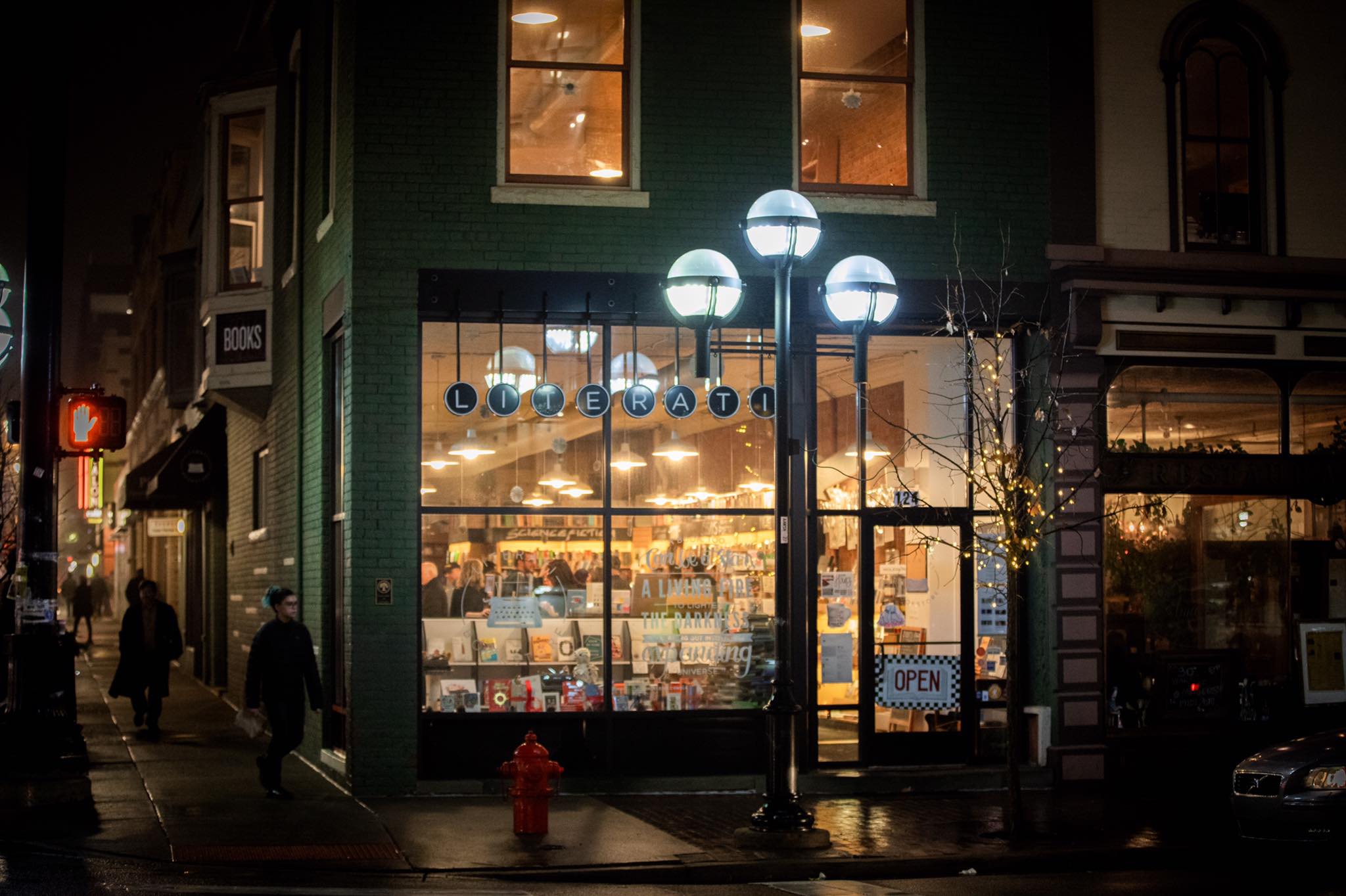 Posted on Facebook by Literati Bookstore, Ann Arbor, Mich.: " 'I was afraid to commit to coming to this town.... I grew up in big cities. My friend showed me this bookstore and this vibrant downtown and I committed!' --Customer comment."
Posted on Facebook by Literati Bookstore, Ann Arbor, Mich.: " 'I was afraid to commit to coming to this town.... I grew up in big cities. My friend showed me this bookstore and this vibrant downtown and I committed!' --Customer comment."
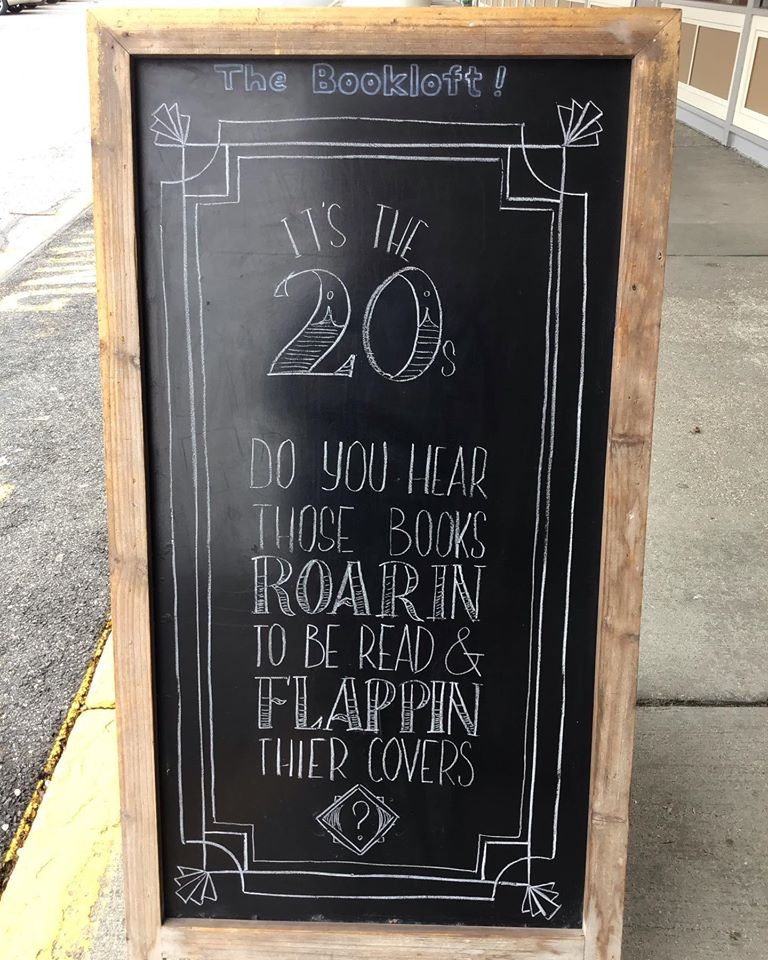 The Bookloft, Great Barrington, Mass., shared a photo of its new decade-themed sidewalk chalkboard, which reads: "It's the '20s. Do you hear those books roarin to be read & flapping their covers?"
The Bookloft, Great Barrington, Mass., shared a photo of its new decade-themed sidewalk chalkboard, which reads: "It's the '20s. Do you hear those books roarin to be read & flapping their covers?"
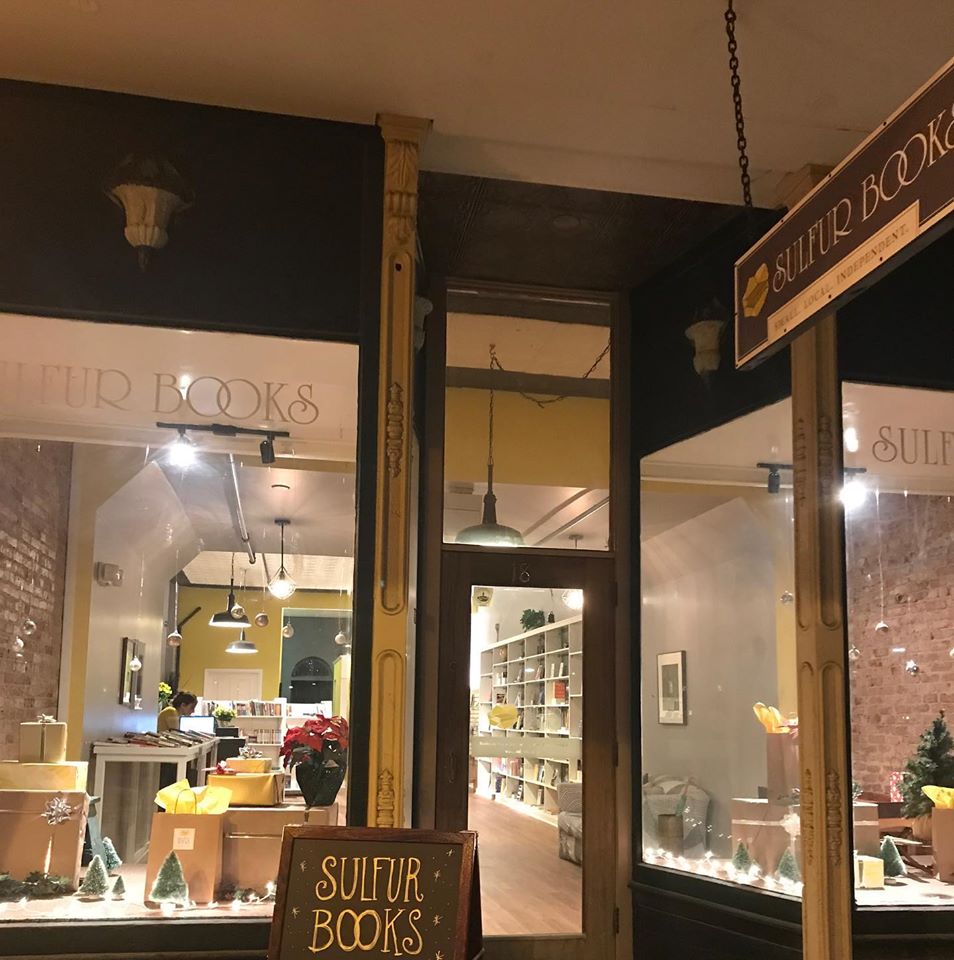 Posted on Facebook by Sulfur Books, Clifton Springs, N.Y.: "Don’t forget that we can order just about anything. If there's a book you want, you can give us a call or stop in. Shop small--Jeff Bezos is doing just fine!"
Posted on Facebook by Sulfur Books, Clifton Springs, N.Y.: "Don’t forget that we can order just about anything. If there's a book you want, you can give us a call or stop in. Shop small--Jeff Bezos is doing just fine!"
 State of War: MS-13 and El Salvador's World of Violence by William Wheeler (Columbia Global Reports).
State of War: MS-13 and El Salvador's World of Violence by William Wheeler (Columbia Global Reports).
HBO Max has greenlighted The Uninhabitable Earth, a climate change anthology series inspired by David Wallace-Wells's bestselling book and New York magazine article. Deadline reported that the series "will be comprised of stand-alone fictional stories covering a wide range of genres and possible futures that could result from the rapid warming of our planet."
Oscar- and Emmy-winning writer Adam McKay (Vice, The Big Short, Talladega Nights) is attached to write and direct the first episode. Deadline wrote that the "plan is for the first season to enlist top directors and writers to join in creating a provocative and entertaining series that taps into our unease with just how delicately our planet is teetering on the precipice."
"Adam is one of the rare artists who can deliver a pointed, impactful message in a piece of great entertainment," said Kevin Reilly, chief content officer, HBO Max and president TBS, TNT and truTV. "I can't wait to see what he does with this material, as there is no timelier and more relevant message than a wake-up call on climate change and the growing impact on our lives."
McKay commented: "I've been chomping at the bit to get this show going. I'm very happy that HBO Max stepped up and made the commitment. There's obviously no subject as vast and daunting."
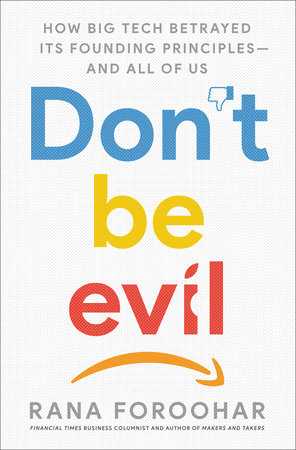 Don't Be Evil: How Big Tech Betrayed Its Founding Principles--and All of Us by Rana Foroohar (Currency) has won the 2019 Porchlight Business Book of the Year Award (formerly the 800-CEO-READ award), presented last night in New York City.
Don't Be Evil: How Big Tech Betrayed Its Founding Principles--and All of Us by Rana Foroohar (Currency) has won the 2019 Porchlight Business Book of the Year Award (formerly the 800-CEO-READ award), presented last night in New York City.
"For many years, the mantra echoing from Silicon Valley has been one of disruption. And disrupt they have, as Rana Foroohar's Don't Be Evil well explores," said Rebecca Schwartz, owner, president & CEO of Porchlight Book Company. "With some of the finest business reporting and writing of the year, this year's Porchlight Business Book Award winner thoroughly documents the results of that disruption, making it essential reading for those who wish to understand both the daily news and its broader implications."
Editorial director Dylan Schleicher added: "That the best book of 2019 came out of the Current Events and Public Affairs category should be no surprise. There are many important and exigent discussions we need to have in the business world and as a society--about the health of individuals, organizations, and our overall economy, about the rise of economic inequality and decline in innovation, about the credibility of the information we receive and the durability of our democratic institutions--and all of them are tied in a big way to the rise of Big Tech. There are many books that covered these developments this year, but Rana Foroohar's examination of the industry and its effects on our world is the most well rounded, all-encompassing, and even handed of them."
Also, Mark Fortier, president of Fortier Public Relations, is the recipient of the sixth annual Jack Covert Award for Contribution to the Business Book Industry. Covert, Porchlight's founder and retired president, commented: "Always impeccably prepared from the day I first met him well over 20 years ago when he was working in the offices of a New York City PR firm, Mark Fortier moved on to start his own company and built one of the premier public relations firms in our industry. His success stems from the human relationships and connections he forms and the hard work he puts into publicizing the best books in the genre year in and year out."
---
Caroline Kim has won the 2020 Drue Heinz Literature Prize for a manuscript of short stories for The Prince of Mournful Thoughts and Other Stories, which will be published by the University of Pittsburgh Press next fall. The award also includes a cash prize of $15,000.
Judge Alexander Chee described the winning book "an extraordinary collection, and the title story alone is an astonishing feat, a fictional imagining of a haunting episode at court in medieval Korea, the problem of a prince who tries to murder his way out of his father's unhappiness with him. The collection takes us in stories across the Korean diaspora, from ancient Korea to the Korean War to Korean Americans living in America in the recent past, the present, and even the future. [Caroline Kim] has a devastating sense of dramatic timing, a keen ear for dialogue, and experiments constantly, with structure, minimalism, science fiction, historical fiction, returning always with insight, intelligence, and an expansive sense of their characters' humanity, which in turn points us to our own. These characters will live in my head a long time."
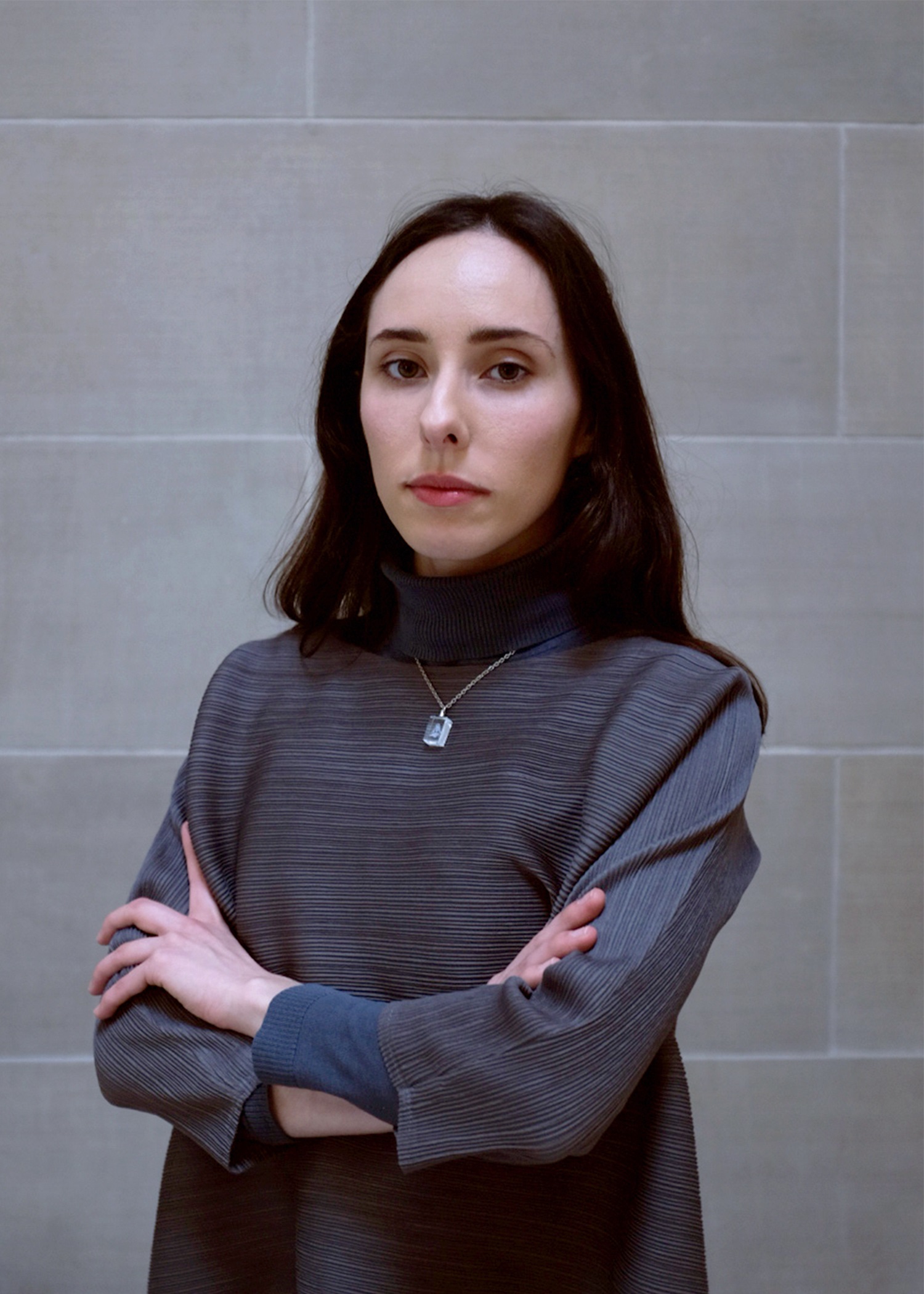 |
|
| photo: Matthew Childers | |
Nicolette Polek is the author of Imaginary Museums: Stories (Soft Skull Press, January 14, 2020). She is a recipient of a 2019 Rona Jaffe Writers' Award, and has been published in Chicago Quarterly Review, New York Tyrant, Hobart, Fanzine and elsewhere. She grew up in Northeast Ohio and lives in Maryland, where she is working on her first novel.
On your nightstand now:
The Collections of Barbara Bloom; Jana Beňová's Honeymoon, which I hope will get translated into English and whose book Seeing People Off I recommend; Megan Boyle's LIVEBLOG; Kathryn Scanlan's forthcoming collection The Dominant Animal; and the Bible.
Favorite books when you were a child:
A Mango-Shaped Space, about a 13-year-old who finds out she has synesthesia. I made this title into my first e-mail address. Also, Regarding the Fountain and the rest of Kate Klise's books, told in memos, letters and other pieces of evidence. I enjoyed books that strung together found objects to make a story, like it was a pasta necklace. I liked field guides on birds and wildflowers.
Top five authors:
This changes, but writers I love to return to are Joy Williams, Lydia Davis, Dorthe Nors, Clarice Lispector and Chelsey Minnis.
Book you've faked reading:
All the President's Men assigned in high school. There was a year that I didn't do much homework and started watching movies. I spent a lot of time sitting by Lake Erie, reading like, Richard Brautigan, and later Candide, which I also may have faked reading.
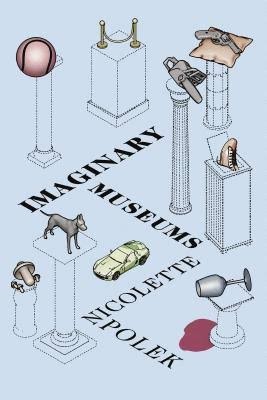 Books in your bag:
Books in your bag:
The Missing Pieces by Henri Lefebvre, which is a winding catalogue of unfinished, destroyed, lost and erased work throughout history, and These Possible Lives by Fleur Jaeggy, a book of three micro-biographies of Thomas De Quincey, John Keats and Marcel Schwob.
Book you've bought for the cover:
The Fitzcarraldo Editions copy of John Keene's Counternarratives. The first edition copy and the Vintage Contemporaries edition of Nicholson Baker's The Mezzanine. NYRB books that I find at book sales.
Book you hid from your parents:
I still shouldn't say.
Book that changed your life:
Land of Green Plums by Herta Müller made me love reading again; a book that follows a group of students in Communist Romania. It's poetic and political, challenging and filled with beauty.
The Life and Opinions of Tristram Shandy, Gentleman by Laurence Stern showed me about being playful with form. It was published in 1759, but still, there's a torn-out chapter, a blank page, a blackened page, a marbled page that at the time would have been different in every copy. There is a squiggle in the middle of a paragraph to show the way a man waves a stick in the air.
Book you most want to read again for the first time:
Us by Michael Kimball. Days of Abandonment by Elena Ferrante, a book that put me in so much despair that I read it in one sitting without getting up to turn on the light after the sun set. It would be cool to read The Rings of Saturn by W.G. Sebald for the first time while completing his walking tour of Suffolk.
White Feathers: The Nesting Lives of Tree Swallows by Bernd Heinrich (Houghton Mifflin Harcourt, $27 hardcover, 256p., 9781328604415, February 18, 2020)
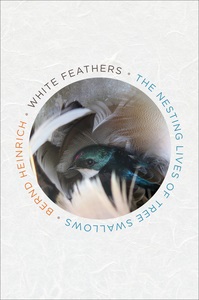 Bernd Heinrich (Mind of the Raven, Life Everlasting) is a celebrated naturalist and birdwatcher. In White Feathers: The Nesting Lives of Tree Swallows, he turns his attention to a little-understood feature of a much-studied species. Tree swallows are considered a "model" bird for research, but Heinrich finds nothing in the literature to explain the phenomenon that intrigues him: Why does the pair nesting outside his door line its nest with white feathers--the hardest kind to find in the remote Maine woods?
Bernd Heinrich (Mind of the Raven, Life Everlasting) is a celebrated naturalist and birdwatcher. In White Feathers: The Nesting Lives of Tree Swallows, he turns his attention to a little-understood feature of a much-studied species. Tree swallows are considered a "model" bird for research, but Heinrich finds nothing in the literature to explain the phenomenon that intrigues him: Why does the pair nesting outside his door line its nest with white feathers--the hardest kind to find in the remote Maine woods?
Over eight summers, Heinrich observes the tree swallows that come to nest outside his cabin, where he installs nest boxes for their use. He is up by dawn each morning in season, and often earlier, at three and four a.m., to track them in the dark by sound. He takes meticulous notes on many dozens of matings, landings and takeoffs, calls and nest visits. He daubs red paint on one female to keep her identity straight, and designs numerous small-scale experiments, for example offering black and white feathers on both black and white tarps and on the plain ground, to test for color preference versus simple contrast against background. Dozens of other bird species are mentioned along the way, but in these pages, Heinrich's attention is singularly tied to a handful of individual tree swallows: blue-green males and their more drab female companions, and the quickly fledged young they rear in the clearing outside Heinrich's cabin.
White Feathers is an unusual book, in that its focus is so complete. Filled with extremely detailed notes, it will be of greatest interest to other tree swallow enthusiasts. But Heinrich's occasional, lovely comment on the art of observation will charm anyone concerned with paying close attention. "My patience was tested by the now constant assault of black flies, which started soon after sunrise. But I could not stop. Many dots are needed before you can connect them into a picture of what it is like to be a tree swallow"; Heinrich is obviously passionately driven to see that picture. "Expecting constantly scintillating observations is the best guarantee of tedium. To be successful as a naturalist requires the mindset of a beggar, eager and thankful for every crumb of information."
Intimately involved with the tree swallows, Heinrich nonetheless does not anthropomorphize, but explains what he sees by way of evolution and other natural forces. In the end, he offers theories as to the titular question of white feathers, but he illuminates many other nuances of tree swallow life as well along the way. The joy of White Feathers is in its careful concentration, its patience and attention to detail and in the obvious joy its author takes in the nesting lives of an unassuming bird. --Julia Kastner, librarian and blogger at pagesofjulia
Shelf Talker: A seasoned naturalist turns his thorough gaze upon a much-studied bird and makes fresh observations in this quietly lovely account.
The mood was relaxed but intense, and many remarked on how easy it was to talk shop and socialize. Several industry veterans went so far as to call it the best bookseller-oriented event they had ever attended. --from a Shelf Awareness report on the inaugural ABA Winter Institute, held January 26-27, 2006, in Long Beach, Calif.
 As I was preparing for Wi15 in Baltimore next week, I found myself keeping an eye on another conference, the National Retail Federation's 2020 Vision: Retail's Big Show, which was held January 12-14 at a venue familiar to the book trade--New York City's Javits Center, site of BookExpo.
As I was preparing for Wi15 in Baltimore next week, I found myself keeping an eye on another conference, the National Retail Federation's 2020 Vision: Retail's Big Show, which was held January 12-14 at a venue familiar to the book trade--New York City's Javits Center, site of BookExpo.
At Wi15, booksellers will be the well-deserved stars. This is as it was meant to be from the start. In 2006, Shelf Awareness noted: "Unlike the experience at BEA, there were few other distractions, and many booksellers enjoyed being the focus. One minor but telling example: at the Thursday lunch, publishers and media people were asked to wait a few minutes until booksellers found seats in the banquet hall. A bookseller commented on how nice it was to go to tables in the front of the room and not find all of them reserved for publishers."
Booksellers would not have been the stars at NRF's conference, but I was intrigued, reading the organization's blog, by the number of issues, goals and strategies up for discussion that seem to already be an essential element of indie bookstore DNA.
 |
|
| A familiar venue: NRF at the Javits Center. | |
While indie booksellers have been in a gradual renaissance for the past decade, NRF CEO Matthew Shay considered a briefer time span: "If you think back about five years ago, there was almost this question of whether the retail industry would survive. And that's no longer really a question. There are still a few pockets of folks who are naysayers that question the health of the industry, but overall, I think there's a recognition that you've got some real opportunities to perform and excel and multiple examples of companies that are doing that. And they're doing it not in the face of or in spite of this dramatic change but they are embracing it."
In a pre-show post titled "Coming soon: Taking stock of where we've been, where we're headed and how long it might take to get there," Susan Reda, NRF's v-p, education strategy and STORES magazine editor, wrote: "Success in 2020 is grounded in offering an incredible retail experience: How retailers tell a story, how shoppers experience it and the emotional connection that's left behind will allow vigilant businesses to raise the bar.... Customers can buy just about anything online; snag their attention with storytelling and hands-on interaction and your 'audience' will remember the experience.... The key to success when it comes to creating a store experience that shoppers want to return to again and again is grounded in engaged associates; investing in human capital is vital."
Nordstrom's co-president Erik Nordstrom spoke about the New York flagship store that opened last year, noting that Manhattan was the company's biggest online market. He observed that the reason for having a physical store has changed and the new location is the most experiential store Nordstrom has. As an example, he cited the inclusion of a bar in the main shoe department. "People are smiling," he said. "Strangers are talking to each other. We think a lot about shoes. I don't know why it took us so long to put drinking and shoes together, but it's a great combination."
Well, I can think of several booksellers who could have told him about that strategy a while back.
Looking forward, looking back.
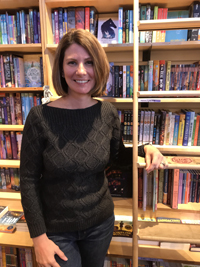 |
|
| Kelly Estep | |
As 2020 began, Bookselling This Week asked ABA board members for their New Year's resolutions. Kelly Estep, co-owner of Carmichael's Bookstore, Louisville, Ky., said: "My resolution this year is to more clearly connect with our community in a way that will ultimately support our business and keep it growing. We are opening a dedicated event space and that will mean an expanded events schedule with some of those possibly being non-book related. Continuing the conversation with customers, community members, and our local and state government that local businesses need and deserve their support is a big part of that goal. For the board, this year is also about connection and direction with an exciting new leadership team at ABA. It's an exciting time to be a bookseller and a privilege to be part of this transition at ABA."
In 2007, around the time of Wi2 in Portland, Ore., I wrote: "Publishing industry headlines are still rife with closing indie bookstores and evolving technology that may threaten the very existence of 'fiber-based' texts. Should we be afraid, like medieval peasants terrified by the prospect of what army or disease might be coming over the hill to annihilate their village next? I don't think that way. It is, as it always has been, the end of some worlds and the beginning of other worlds. The peasants adapt to survive. So do the artists."
Oh, one last item from the NRF conference: Forbes reported that "this year, at the retail show, the country's largest retailers are talking about their plans to use robots, artificial intelligence, computer vision, and machine learning as a way to let their human staff do what humans do best, and connect with other humans--their customers."
My prediction: Wi15 will have great discussions about business and books, but the robots... will be fictional.